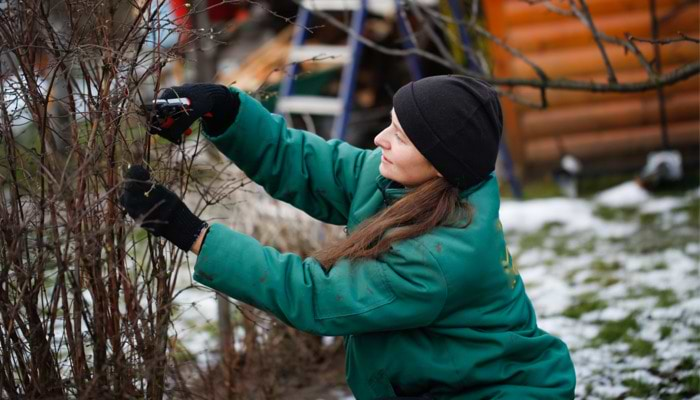
© Natalia Lebedinskaia / Shutterstock.com
Although the weather might not be great, now is the perfect time to carry out those important January garden maintenance jobs in readiness for the spring. There's plenty you can do around your garden this month to bring benefits later on in the year.
The rain that has prevailed since Christmas is no reason to hide away indoors – so, put your wellies on and get out into the garden for some fresh air and physical activity!
Health benefits
Being outdoors during the Covid-19 lockdown can benefit your physical and mental health. Gardening is good manual work that benefits your heart. Digging, weeding and planting burns calories and provides cardiovascular exercise, thus strengthening your heart.
Exposure to sunlight can give you a much-needed dose of vitamin D to help increase calcium levels, providing benefits for your bones and immune system, so if you manage to catch a little winter sunshine, make the most of it.
Gardening can also help reduce stress, anxiety and depression, as it gives you the chance to focus on something different. You have a goal and have to work at it to achieve your aims. This can be particularly beneficial during the current lockdown, when people may be feeling lower than normal.
Watching plants grow and thrive is a great morale booster that can really make a difference to your frame of mind. It's something you can enjoy alone, or with other family members, including children.
Even if it's slightly wet outside, pop on a waterproof coat and get some fresh air anyway. Gardening is a fantastic way to get motivated if you're stuck in a rut and bored with your normal everyday routine.
Growing fruit and veg
Another major health benefit is growing your own fresh fruit and vegetables - not to mention saving money by not having to buy as much at the supermarket. If you have a vegetable garden, fruit trees, or herbs, you know none of your produce has been treated with pesticides. It's as close to "farm to table" as you can get.
January is a good time to start preparing for the spring because your plants are still dormant. Prune blackcurrant bushes, gooseberries and redcurrants, but leave apricots, cherries and plums ‘til later in the year. Prune apple and pear trees - unless there's a frost.
Establish raspberry canes in well-drained soil in a spot that catches the sun. Plant any new fruit bushes in a sheltered spot. Your own freshly-grown fruit will be much tastier than what you buy in a shop.
January is also a good time to cultivate parsnips and leeks and to put your potatoes in a sunny, frost-free patch. Start off growing them in containers or grow-bags until they begin to sprout. If a frost sets in, take them in the greenhouse, or protect them with horticultural fleece.
What wildlife will you see?
The most prevalent January visitors to your garden will be wild birds, who will all be desperate for food during the lean winter months. Britain's national bird, the robin, a symbol of Christmas, is around all year and can still be spotted in January.
Other garden visitors this month will include sparrows, wrens, blue tits, redwings, waxwings and bullfinches. If you like seeing birds in your garden, provide nesting boxes to help keep them warm and dry on these chilly winter nights. Also, provide a raised bird table, so they can eat in safety, away from cats.
Put out plenty of food. The best winter foods include dried mealworms, a good mix of different seeds, suet pellets, corn, shelled unsalted peanuts and black sunflower seeds. Food filled with protein will help the birds maintain their body weight and stay healthy during a month when natural food may be hard to find. Make sure you remember to provide fresh water and make sure it hasn't frozen over during the night.
Maybe you’d like to take part in the Big Garden Birdwatch 2021? Simply spend an hour counting the feathered visitors to your garden and inform the RSPB of your findings. The RSPB now has over 40 years’ data, which helps them to understand the challenges faced by our precious wildlife. The information you gather will help them to spot any problems, and perhaps more importantly, do something about them before it is too late. The Count runs between 29th January and 19th February.
Once you've started gardening in January, keep it up - don't let the unpredictable weather undo all your hard work! If your garden is damaged by wind or heavy rain, tidy it again at the first available opportunity.
Start now, to reap the rewards this summer!





